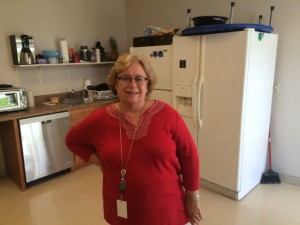Editor’s note: redefinED is supporting National Autism Awareness Month each Saturday in April by reposting articles from our archives that celebrate those who champion the educational rights of children with autism. Today’s post, which originally appeared in November 2015, relates the story of a South Florida mom who refused to give up until she found the right school for her daughter.
by Travis Pillow
When Charleen Decort was looking for the right school for her daughter, she traveled around South Florida, looking at factors some parents rarely consider, like the color of the walls and the shade of the lights.
When she found her current school, a predecessor of what is now Connections Education Center of the Palm Beaches, another factor carried the day: Trust.
“She has to feel comfortable around you,” Decort said of her daughter, who has autism, “and they take the time to do that here. That’s big.”
She got on the waiting list for the school’s early learning program. If a spot hadn’t opened in time for kindergarten, Decort said she would have considered teaching her daughter at home, or even moving somewhere else.

Fortunately, she found a place for her daughter, now in third grade, in a growing array of small schools, some public, some private, that are purpose-built to serve children who might be distracted by the flickering of a fluorescent bulb, or rely on an iPad to communicate, or have other special needs that can be hard to accommodate in traditional schools.
Connections — currently a private school, with a charter application set to be approved later today by the Palm Beach County School Board — is a newcomer to this sector-agnostic niche, which caters to children with autism.
Debra Johnson helped start Connections this year, after the Renaissance Learning Center, where she had been principal, moved north to Jupiter. It’s now housed in a world-class facility at the Els Center for Autism, as first reported by the Palm Beach Post. Johnson and several other employees launched the new school in West Palm Beach to accommodate parents who couldn’t make the drive to the north end of the county.
Other schools have sprung up in surrounding communities, with different emphases but similar goals. There’s the Palm Beach School for Autism, a charter school in Lantana. Mountaineers School of Autism is a K-12 private school in West Palm Beach. Oakstone Academy promotes inclusion for special needs students.
Johnson said there’s enough demand to support diverse options. Schools like hers can serve a limited number of students, and want to keep student-to-staff ratios low. Connections currently serves slightly more than 20 students, with a student-to-staff ratio of about two-to-one. Its charter application suggests it could eventually grow to 85 students in grades K-8.
“We want to stay small,” Johnson said. “We picked the name Connections Education Center because that’s our mission — to be connected with the parents and the community.”
One recent morning, older students were communicating with teachers using a TouchChat iPad app. Across the hall, other students worked on art therapy, building models of their hands with clay.
In an adjacent room, some of the school’s youngest students listened to the “Wheels on the Bus.” One child focused his gaze on the pages of an accompanying book. One sat still, bristling at the loud noise. One cracked a smile and started dancing to the music.
Three children, sitting just a few feet from each other, were having completely different reactions. That, Johnson said, is why individual attention can make a difference.
“If you’ve met one person with autism, you’ve met one person with autism,” she said.
The school can afford to hire extra staff thanks in part to its benefactors. Johnson said Connections started with financial support from a “very generous angel” who has a family member with autism but wants to remain anonymous. Its narrow focus also helps it apply for grants. According to its charter application, the school “has the backing of two family foundations and other community partners to assist in bridging the gap between public and private funding.”
Decort, who also serves as the school’s parent liaison, said the result is a school that is “more family-like,” that can “tailor (instruction) to what your child needs,” and that helps children prepare to live independently. It takes students on shopping trips and out to restaurants, to help teach life skills they’ll need as adults.
“She doesn’t need a babysitter,” she said of her daughter. “She needs someone who will challenge her.”


